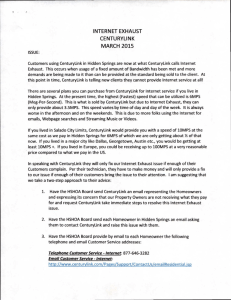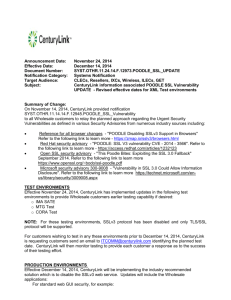Page 1 © CenturyLink, Inc. All Rights Reserved. CONFIDENTIAL V1
advertisement
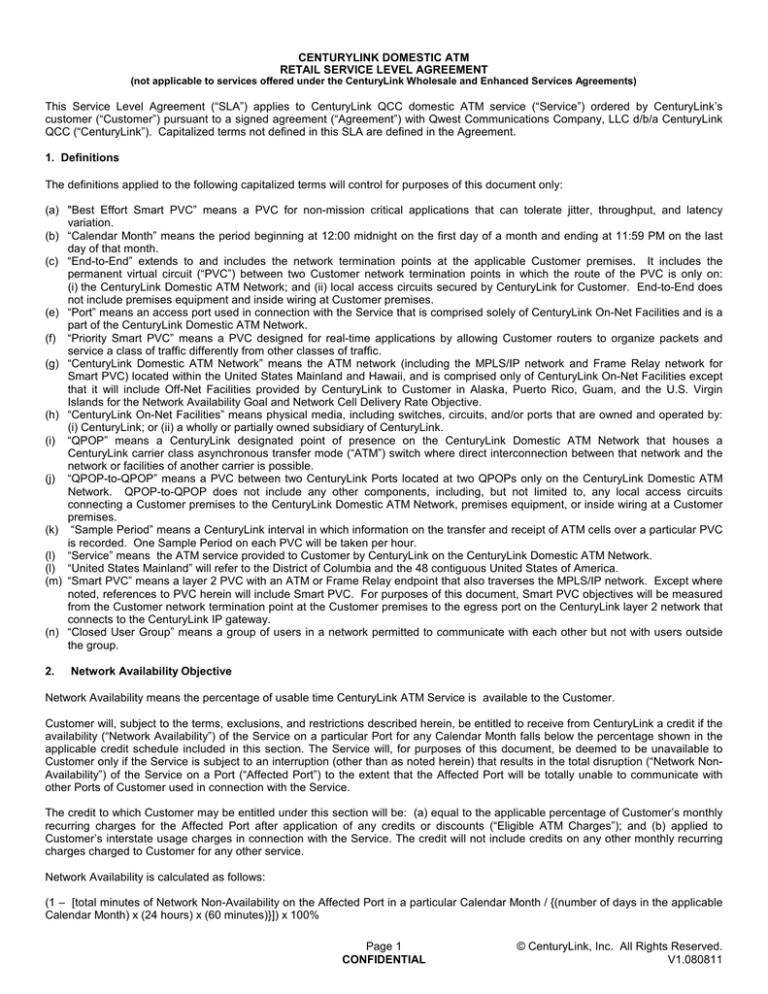
CENTURYLINK DOMESTIC ATM
RETAIL SERVICE LEVEL AGREEMENT
(not applicable to services offered under the CenturyLink Wholesale and Enhanced Services Agreements)
This Service Level Agreement (“SLA”) applies to CenturyLink QCC domestic ATM service (“Service”) ordered by CenturyLink’s
customer (“Customer”) pursuant to a signed agreement (“Agreement”) with Qwest Communications Company, LLC d/b/a CenturyLink
QCC (“CenturyLink”). Capitalized terms not defined in this SLA are defined in the Agreement.
1. Definitions
The definitions applied to the following capitalized terms will control for purposes of this document only:
(a) "Best Effort Smart PVC” means a PVC for non-mission critical applications that can tolerate jitter, throughput, and latency
variation.
(b) “Calendar Month” means the period beginning at 12:00 midnight on the first day of a month and ending at 11:59 PM on the last
day of that month.
(c) “End-to-End” extends to and includes the network termination points at the applicable Customer premises. It includes the
permanent virtual circuit (“PVC”) between two Customer network termination points in which the route of the PVC is only on:
(i) the CenturyLink Domestic ATM Network; and (ii) local access circuits secured by CenturyLink for Customer. End-to-End does
not include premises equipment and inside wiring at Customer premises.
(e) “Port” means an access port used in connection with the Service that is comprised solely of CenturyLink On-Net Facilities and is a
part of the CenturyLink Domestic ATM Network.
(f) “Priority Smart PVC” means a PVC designed for real-time applications by allowing Customer routers to organize packets and
service a class of traffic differently from other classes of traffic.
(g) “CenturyLink Domestic ATM Network” means the ATM network (including the MPLS/IP network and Frame Relay network for
Smart PVC) located within the United States Mainland and Hawaii, and is comprised only of CenturyLink On-Net Facilities except
that it will include Off-Net Facilities provided by CenturyLink to Customer in Alaska, Puerto Rico, Guam, and the U.S. Virgin
Islands for the Network Availability Goal and Network Cell Delivery Rate Objective.
(h) “CenturyLink On-Net Facilities” means physical media, including switches, circuits, and/or ports that are owned and operated by:
(i) CenturyLink; or (ii) a wholly or partially owned subsidiary of CenturyLink.
(i) “QPOP” means a CenturyLink designated point of presence on the CenturyLink Domestic ATM Network that houses a
CenturyLink carrier class asynchronous transfer mode (“ATM”) switch where direct interconnection between that network and the
network or facilities of another carrier is possible.
(j) “QPOP-to-QPOP” means a PVC between two CenturyLink Ports located at two QPOPs only on the CenturyLink Domestic ATM
Network. QPOP-to-QPOP does not include any other components, including, but not limited to, any local access circuits
connecting a Customer premises to the CenturyLink Domestic ATM Network, premises equipment, or inside wiring at a Customer
premises.
(k) “Sample Period” means a CenturyLink interval in which information on the transfer and receipt of ATM cells over a particular PVC
is recorded. One Sample Period on each PVC will be taken per hour.
(l) “Service” means the ATM service provided to Customer by CenturyLink on the CenturyLink Domestic ATM Network.
(l) “United States Mainland” will refer to the District of Columbia and the 48 contiguous United States of America.
(m) “Smart PVC” means a layer 2 PVC with an ATM or Frame Relay endpoint that also traverses the MPLS/IP network. Except where
noted, references to PVC herein will include Smart PVC. For purposes of this document, Smart PVC objectives will be measured
from the Customer network termination point at the Customer premises to the egress port on the CenturyLink layer 2 network that
connects to the CenturyLink IP gateway.
(n) “Closed User Group” means a group of users in a network permitted to communicate with each other but not with users outside
the group.
2.
Network Availability Objective
Network Availability means the percentage of usable time CenturyLink ATM Service is available to the Customer.
Customer will, subject to the terms, exclusions, and restrictions described herein, be entitled to receive from CenturyLink a credit if the
availability (“Network Availability”) of the Service on a particular Port for any Calendar Month falls below the percentage shown in the
applicable credit schedule included in this section. The Service will, for purposes of this document, be deemed to be unavailable to
Customer only if the Service is subject to an interruption (other than as noted herein) that results in the total disruption (“Network NonAvailability”) of the Service on a Port (“Affected Port”) to the extent that the Affected Port will be totally unable to communicate with
other Ports of Customer used in connection with the Service.
The credit to which Customer may be entitled under this section will be: (a) equal to the applicable percentage of Customer’s monthly
recurring charges for the Affected Port after application of any credits or discounts (“Eligible ATM Charges”); and (b) applied to
Customer’s interstate usage charges in connection with the Service. The credit will not include credits on any other monthly recurring
charges charged to Customer for any other service.
Network Availability is calculated as follows:
(1 – [total minutes of Network Non-Availability on the Affected Port in a particular Calendar Month / {(number of days in the applicable
Calendar Month) x (24 hours) x (60 minutes)}]) x 100%
Page 1
CONFIDENTIAL
© CenturyLink, Inc. All Rights Reserved.
V1.080811
The Network Non-Availability will be deemed to commence with: (a) CenturyLink’s or a CenturyLink utilized customer resource
center‘s ("CRC") receipt from Customer of a notice of the Network Non-Availability and CenturyLink or a CRC’s issuance of a trouble
ticket; or (b) CenturyLink or a CRC’s detection of the Network Non-Availability and CenturyLink or a CRC’s prompt issuance of a
trouble ticket. The Network Non-Availability will conclude when CenturyLink or a CRC makes a reasonable determination that the
Service has been restored. The CenturyLink Trouble Management System determines the number of minutes of a Network NonAvailability for the Service.
The following credit schedule provides Network Availability objectives measured solely from QPOP-to-QPOP. If Customer receives a
credit for a particular Affected Port in a particular Calendar Month, Customer is not entitled to any other credits under this SLA for that
Port in that Calendar Month.
Credit Schedule for QPOP-to-QPOP Service
Network Availability
Upper Level
Lower Level
100.00%
99.98%
99.90%
99.50%
98.99%
98.50%
97.99%
97.50%
96.99%
96.50%
99.99%
99.91%
99.51%
99.00%
98.51%
98.00%
97.51%
97.00%
96.51%
00.00%
Amount of credit
(as a % of the Eligible ATM
Charges for the Affected Port)
0%
5%
10%
20%
30%
30%
40%
50%
75%
100%
The following credit schedule provides Network Availability objectives measured on an End-to End basis, except for Smart PVCs which
are measured to the egress port. The Network Availability objectives and related remedies do not include:
(a) any network elements provided by a third party provider beyond the CenturyLink Network-to-Network Interface (“NNI”); and
(b) any local access services that are not secured by CenturyLink.
If Customer receives a credit for a particular Affected Port in a particular Calendar Month, Customer is not entitled to any other credits
under this SLA for that Port in that Calendar Month.
Credit Schedule for End-to-End Service
Network Availability
Upper Level
Lower Level
100.00%
99.50%
98.99%
98.50%
97.99%
97.50%
96.99%
96.50%
95.99%
95.50%
99.51%
99.00%
98.51%
98.00%
97.51%
97.00%
96.51%
96.00%
95.51%
00.00%
Amount of credit
(as a % of the Eligible ATM
Charges for the Affected Port)
0%
5%
10%
20%
30%
30%
40%
50%
75%
100%
3. Network Cell Delivery Rate Objective
The cell delivery rate (“CDR”) objective on a PVC between two QPOPs on the CenturyLink Domestic ATM Network is the value of (1(CLR)). CLR for all PVCs except for Smart PVCs is the value obtained by dividing the number of Customer cells that are lost on a
particular PVC on the CenturyLink Domestic ATM Network during a Sample Period due to error or congestion on the CenturyLink
Domestic ATM Network by the number of cells transmitted across the particular PVC during the Sample Period (excluding cells in
transit during a Sample Period). The CLR for Priority Smart PVC is the value obtained by dividing the number of Customer cells that
are lost on all Customer Priority Smart PVCs in a Closed User Group during a Sample Period due to error or congestion on the
CenturyLink Domestic ATM Network by the number of cells transmitted across all Customer Priority Smart PVCs in the Closed User
Group during the Sample Period (excluding cells in transit during a Sample Period). CenturyLink’s monthly average CDR objective for
a particular Customer PVC on the CenturyLink Domestic ATM Network is shown in the following schedule for each quality of service
category included in that schedule. Available bit rate (“ABR”), unspecified bit rate (“UBR”), and best effort Smart PVC are not qualities
of service with a guaranteed CDR.
Page 2
CONFIDENTIAL
© CenturyLink, Inc. All Rights Reserved.
V1.080811
Traffic Type (Quality of Service)
Monthly Average CDR objective
Traffic Covered
Constant bit rate
99.99%
Transmissions within peak cell
rate (“PCR”) 1
Variable bit rate real time
99.97%
Transmissions within sustained
cell rate (“SCR”) 2
Variable bit rate non-real time
99.95%
Transmissions within SCR
Priority Smart PVC
99.95%
Transmissions within subscribed
Priority Smart PVC bandwidth
4
rate
2,3
1
Cells within SCR (PCR = SCR for CBR ) will be designated by the CenturyLink switch by a cell header with a cell loss priority
(“CLP”)=0.
2
Cells within SCR will be designated by the CenturyLink switch by a cell header with a CLP=0.
3
Does not apply to Service with local loop oversubscription for Variable bit rate non-real time.
4
Does not cover transmissions where customer egress port Priority Smart PVC capacity is exceeded due to Customer
oversubscription.
CDR measures only the delivery of cells over a PVC on the CenturyLink Domestic ATM Network. External factors to the CenturyLink
Domestic ATM Network that may cause cell loss (including, without limitation, failure of access circuits, and/or Customer premises
equipment) are excluded from the measurement.
Subject to the terms, exclusions and restrictions described in this document, if in any two consecutive Calendar Months, CenturyLink
does not meet its objective for CDR (for traffic covered) as specified in the schedule above for a particular PVC or a Closed User
Group for Priority Smart PVCs (“Impacted PVC”), Customer will receive a credit from CenturyLink for such second Calendar Month
(and each consecutive Calendar Month thereafter until CenturyLink is in compliance with the CDR parameters specified in that
schedule) in accordance with the applicable schedule below and the procedures set forth herein. Such credit will be equal to the
designated percentage of Customer’s PVC monthly recurring charges after all applicable discounts and credits have been applied
(“Eligible PVC Charges”) for the Impacted PVC for that Calendar Month. Credits will only be due if CenturyLink misses the specified
CDR in two or more consecutive Calendar Months.
In order to be eligible for a credit under this section, a trouble ticket must be issued under the CenturyLink Trouble Management
System in the manner set forth in Section 2 within five business days after the conclusion of the particular Calendar Month in which
CenturyLink failed to achieve the delivery rate objective for which Customer may receive a credit.
A. Constant Bit Rate
The following credit schedule applies to a Service that CenturyLink provides to Customer on a constant bit rate PVC.
Credit Schedule For A Constant Bit Rate PVC
Monthly Average
Amount of credit
(as a % of Eligible PVC Charges
for the Impacted PVC)
Cell delivery rate objective
Upper Level
Lower Level
100.00%
99.98%
99.49%
99.00%
98.00%
97.00%
96.00%
99.99%
99.50%
99.01%
98.01%
97.01%
96.01%
0.00%
0%
5%
10%
20%
30%
40%
50%
B. Variable Bit Rate Real Time
The following credit schedule applies to a Service that CenturyLink provides to Customer on a variable bit rate real time PVC.
Page 3
CONFIDENTIAL
© CenturyLink, Inc. All Rights Reserved.
V1.080811
Credit Schedule For A Variable Bit Rate Real Time PVC
Monthly Average
Amount of credit
(as a % of Eligible PVC
Charges for the Impacted PVC)
Cell delivery rate objective
Upper Level
Lower Level
100.00%
99.94%
99.49%
99.00%
98.00%
97.00%
96.00%
99.95%
99.50%
99.01%
98.01%
97.01%
96.01%
0.00%
0%
5%
10%
20%
30%
40%
50%
C. Variable Bit Rate Non Real Time
The following credit schedule applies to a Service that CenturyLink provides to Customer on a variable bit rate non-real time PVC.
Credit Schedule For A Variable Bit Rate Non-Real Time PVC
Monthly Average
Amount of credit
(as a % of Eligible PVC
Charges for the Impacted PVC)
Cell delivery rate objective
Upper Level
Lower Level
100.00%
99.94%
99.49%
99.00%
98.00%
97.00%
96.00%
99.95%
99.50%
99.01%
98.01%
97.01%
96.01%
0.00%
0%
5%
10%
20%
30%
40%
50%
D. Priority Smart PVC
The following credit schedule applies to a Service that CenturyLink provides to Customer on Priorty Smart PVC.
Credit Schedule For Priority Smart PVC
Monthly Average
Amount of credit
(as a % of Eligible PVC
Charges for the Impacted PVC)
Cell delivery rate objective
Upper Level
Lower Level
100.00%
99.94%
99.49%
99.00%
98.00%
97.00%
96.00%
99.95%
99.50%
99.01%
98.01%
97.01%
96.01%
0.00%
0%
5%
10%
20%
30%
40%
50%
No credits are applicable for available bit rate, unspecified bit rate, or best effort Smart PVC quality of service CDR performance.
4.
Network Transit Delay (or Latency) Objective
The following schedule shows the monthly average roundtrip ATM cell network transit delay (“NTD”) objective for a particular PVC on
the CenturyLink Domestic ATM Network that is either:
(a) between two CenturyLink Ports and does not pass through a network to network interface; or
(b) between a CenturyLink Port and a network to network interface connecting the CenturyLink Domestic ATM Network to a network of
another carrier.
Page 4
CONFIDENTIAL
© CenturyLink, Inc. All Rights Reserved.
V1.080811
The cell Latency objective is measured in milliseconds. There is no Latency objective or credits available for Service to the Off-Net
Facilities provided by CenturyLink in Alaska, Puerto Rico, Guam, and the U.S. Virgin Islands. The Latency objective for a particular
PVC on the CenturyLink Domestic ATM Network is measured based on the quality of service for a particular PVC. Available bit rate,
unspecified bit rate, and best effort Smart PVC are not qualities of service with a guaranteed NTD.
Traffic Type (Quality
of Service)
Monthly Average NTD
Objective on PVCs within
the United States Mainland
Monthly Average NTD
Objective on PVCs between
Hawaii and California
Constant bit rate
90 ms
75 ms
Monthly Average NTD
Objective on PVCs between
Hawaii and the United States
Mainland (except for
California)
165 ms
Variable bit rate real
time
Variable bit rate nonreal time
Priority Smart PVC
95 ms
80 ms
175ms
100ms
85 ms
185 ms
100ms
85 ms
185 ms
For purposes of this document, NTD is defined as the period of time commencing with transmission of the cell from the originating Port
to the time of receipt of the cell at the originating Port after the cell’s roundtrip transfer on a particular Customer PVC as set forth
above. In the case of Priority Smart PVC, NTD is calculated by adding the individual NTDs for the layer 2 access PVCs and NTD for
the MPLS/IP network. External factors to the CenturyLink Domestic ATM Network that may cause delay (including, without limitation,
access serialization, access link congestion, Customer provided equipment and network to network interface gateways and Customer
premises equipment) are excluded from the measurement.
Subject to the terms, exclusions and restrictions described in this document, if, in any two consecutive Calendar Months, CenturyLink
does not meet its objective for NTD as specified in the schedule above for a particular PVC (“Affected PVC”), Customer will receive a
credit from CenturyLink for such second month (and each consecutive Calendar Month thereafter until CenturyLink is in compliance
with the NTD parameters specified in that schedule) in accordance with the schedule below and procedures described herein. Such
credit will be equal to the designated percentage of Customer’s Eligible PVC Charges for the Affected PVC for that Calendar Month.
Credits will only be due if CenturyLink misses the specified NTD in two or more consecutive Calendar Months.
In order to be eligible for a credit under this section, a trouble ticket must be issued under the CenturyLink Trouble Management
System in the manner set forth in Section 2 within five business days after the conclusion of the particular Calendar Month in which
CenturyLink failed to achieve the NTD objective for which Customer may receive a credit.
Monthly Average Latency for each
Qualified QoS Parameter/Geographic
Location
Amount of credit
(as % of Eligible PVC Charges for the
Affected PVC)
Greater than 100% of objective
10%
Greater than 125% of objective
15%
Greater than 150% of objective
25%
No credits are applicable for ABR, UBR, or best effort Smart PVC quality of service NTD performance.
5. Chronic
Subject to the terms, exclusions and restrictions described herein, if, during three consecutive Calendar Months or any six Calendar
Months in any 12 month period, the aggregate amount of credits received by Customer in accordance with this document for a
particular Affected Port on the CenturyLink Domestic ATM Network, Impacted PVC or Affected PVC, as applicable, exceeds 50% of
Customer’s total monthly recurring charges, after application of any discounts or credits, for that Port and/or PVCduring the applicable
period, Customer may, upon 30 days’ prior written notice to CenturyLink, terminate the Affected Port, Impacted PVC or Affected PVC
without incurring any early termination charges associated with that Port and/or PVC except for usage charges accrued to the date of
termination.
Subject to the terms, exclusions and restrictions described herein, if, during three consecutive Calendar Months or any six Calendar
Months in any 12 month period, the aggregate amount of credits received by Customer in accordance with this document for all
Affected Ports on the CenturyLink Domestic ATM Network, Impacted PVCs or Affected PVCs exceeds 50% of Customer’s total
monthly recurring charges, after application of any discounts or credits, for all of Customer’s Ports, and PVCs, during the applicable
period, Customer may, upon 30 days’ prior written notice to CenturyLink and the exhaustion of all CenturyLink and Customer
escalation procedures, terminate all of the ATM service provided to Customer by CenturyLink on the CenturyLink Domestic ATM
Network, without incurring any early termination charges associated with the Services, except for usage charges accrued to the date of
termination.
Customer must exercise any termination right available to it under this section within 30 days after the end of the month Customer first
becomes eligible to exercise the applicable termination right. In the event Customer fails to comply with the condition set forth in the
Page 5
CONFIDENTIAL
© CenturyLink, Inc. All Rights Reserved.
V1.080811
immediately preceding sentence, Customer will, with respect to the applicable termination right, have waived its right to such
termination right.
6. General Terms and Conditions
CenturyLink is offering the Service in accordance with the Rates and Services Schedule and any applicable state tariffs.
A credit request must be submitted through the 1-800 Customer Service number on the customer’s Billing Invoice or the Sales
Marketing Representative. To be eligible for credits under this document, Customer must, in addition to complying with the other terms
included in this document, submit necessary supporting documentation and request reimbursement or credits hereunder within 15
days (unless otherwise provided herein) of the conclusion of the service month in which the requisite unavailability or service
degradation occurs. In the event Customer fails to comply with the condition set forth in the immediately preceding sentence,
Customer will, with respect to that remedy, have waived its right to such remedy.
In the event that Customer is entitled to multiple credits under this document arising from the same event, such credits will not be
cumulative and Customer will be entitled to receive only the maximum single credit available for such event not to exceed 100% of the
monthly charges.
Cumulative credits for all performance objectives included in this document for the Service for any Calendar Month must exceed
$25.00 to be processed.
Customer may receive credits for a particular Service pursuant to the performance objectives included in this document for a maximum
of four consecutive months or a maximum of six months in any 12 month period.
The remedies included in this document are Customer’s sole and exclusive remedies from CenturyLink for disruption or degradation of
the Service and will apply in lieu of any other service interruption guarantee or credit, outage guarantee or credit or performance credit
for which Customer might have otherwise been eligible from CenturyLink.
The objectives and related remedies set forth in this document will not apply to CenturyLink services other than the Service.
7. Restrictions and Exclusions
A period of Network Non-Availability or the failure of a cell to be properly transmitted for purposes of measuring NTD and CDR
objectives included in this document will not be deemed to have occurred in the event that the Service is unavailable or impaired due
to any of the following:
(a) Interruptions or times of service degradation on a PVC that is not an “Accepted Circuit” where an Accepted Circuit is one that
CenturyLink and Customer have tested and mutually agree is working as ordered following provisioning of an order or change
order and for which CenturyLink has commenced billing the Customer;
(b) Interruptions or times of service degradation caused by the negligence, error or omission of Customer or others authorized by
Customer to use or modify Customer’s service;
(c) Interruptions or times of service degradation due to failure of power at Customer premises or failure or poor performance of
Customer premises equipment;
(d) Interruptions or times of service degradation during any period in which CenturyLink or its agents are not afforded access to the
premises where the access lines associated with Customer’s service are terminated; provided such access is reasonably
necessary to prevent a degradation or to restore service;
(e) Interruptions or times of service degradation during any period when CenturyLink has posted on the CenturyLink Web site or
communicated to Customer in any other manner that Customer’s service will be unavailable for maintenance or rearrangement
purposes, or Customer has released the service to CenturyLink for the installation of a customer service order;
(f) Interruptions or times of service degradation during any period when Customer elects not to release the service(s) for testing
and/or repair and continues to use it on an impaired basis;
(g) Interruptions or times of service degradation resulting from force majeure events beyond the reasonable control of CenturyLink
including, but not limited to, acts of God, government regulation, labor strikes, national emergency, or war (declared or
undeclared);
(h) Interruptions or times of service degradation resulting from Customer’s use of the service in an unauthorized or unlawful manner;
(i) Interruptions or times of service degradation resulting from a CenturyLink disconnect for Customer’s breach of a term set forth in
the agreement pursuant to which CenturyLink is providing the Service to Customer or QC is providing a local access service to
Customer;
(j) Interruptions or times of service degradation resulting from incorrect, incomplete or inaccurate orders from Customer (including,
without limitation, Customer’s over subscription of Ports);
(k) Interruptions or times of service degradation due to improper, inaccurate or special network specifications requested by Customer
that are not included in CenturyLink’s standard specifications of the service and/or CenturyLink’s internal operational processes;
(l) Interruptions or times of service degradation resulting from a failure of the local access circuit or tail circuits not secured by
CenturyLink in connection with End-to-End service;
(m) Any interruptions, added latency, lost cells or times of service degradation resulting in whole or in part due (in any manner) to
Customer’s use of an NNI between the CenturyLink Domestic ATM Network and the network of a third party carrier; or
Page 6
CONFIDENTIAL
© CenturyLink, Inc. All Rights Reserved.
V1.080811
(n) Interruptions or times of service degradation occurring after CenturyLink or the CRC reasonably believes it has restored a
particular Service and is unable to contact the person designated by Customer as being the person to contact in the event of an
interruption or degradation of the Service and restoration of a Service.
Page 7
CONFIDENTIAL
© CenturyLink, Inc. All Rights Reserved.
V1.080811
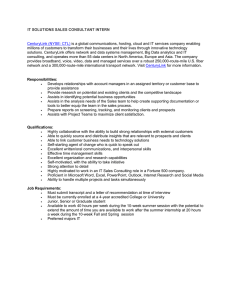
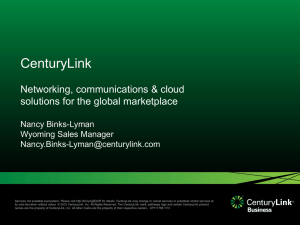
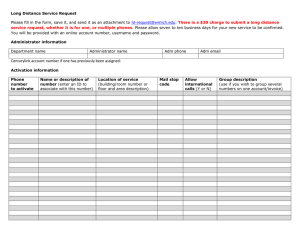
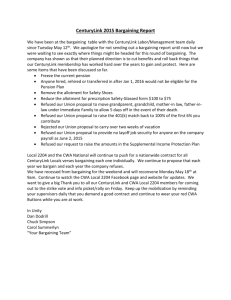
![CenturyLink [PPT]](http://s2.studylib.net/store/data/005561373_1-dc9a5c20956491e26756b6befaa579a4-300x300.png)
